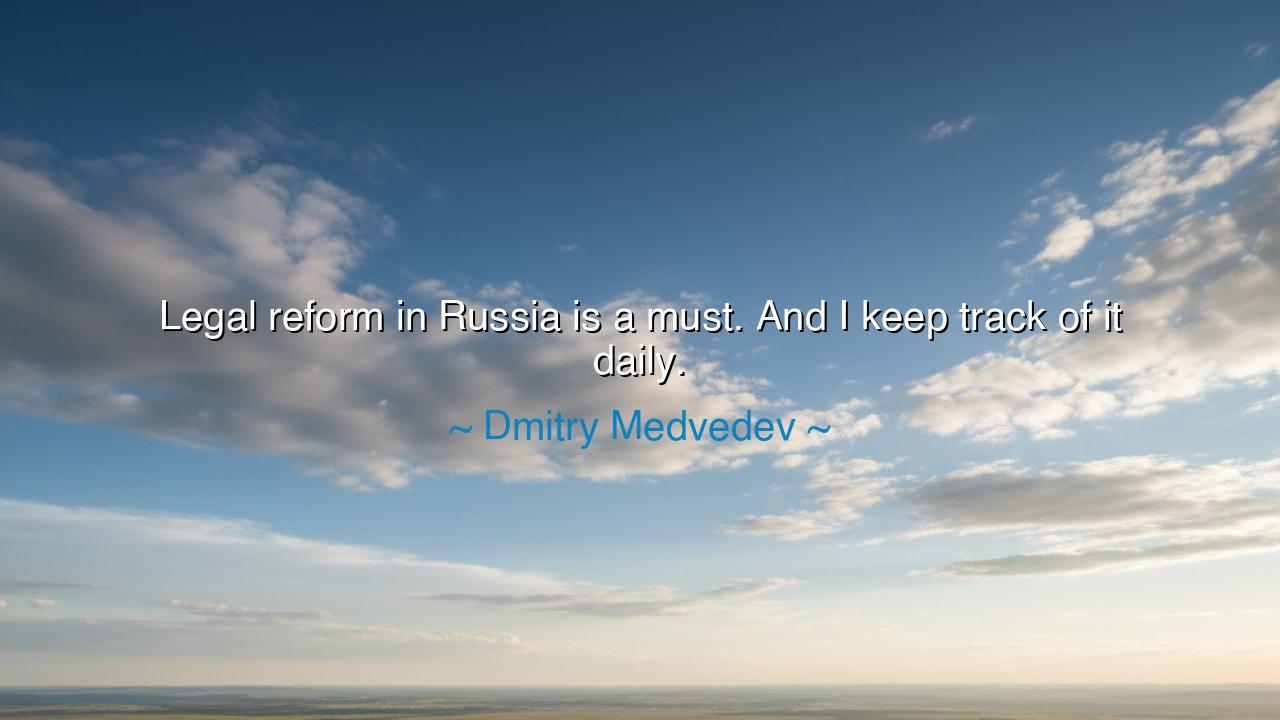
Legal reform in Russia is a must. And I keep track of it daily.






Hearken, O seekers of order and understanding, to the words of Dmitry Medvedev, who declared: “Legal reform in Russia is a must. And I keep track of it daily.” In this brief yet potent statement lies the echo of an ancient truth—that a nation’s strength is not found merely in its armies or wealth, but in the laws that bind it, and the justice that animates those laws. Medvedev, once a guardian of Russia’s governance, speaks here not only as a ruler but as a student of his own society—one who knows that without reform, the law itself decays into mere ritual, a mask without spirit.
Since the dawn of civilization, rulers have learned that the might of empire is fleeting unless anchored in justice. The pharaohs of Egypt built pyramids that pierced the heavens, yet their reigns faded when corruption crept into the courts. The emperors of Rome commanded legions that spanned the world, yet their fall began when the laws that once protected citizens became tools of tyranny. Medvedev’s insistence on reform thus arises from an eternal recognition: that the legal system, though born of wisdom, must never be static. Like a river, it must flow, cleanse, and renew itself, lest it stagnate and poison the land it once nourished.
The phrase “I keep track of it daily” reveals more than diligence—it reveals a philosophy. For true reform is not achieved in bursts of revolution, but in the quiet, relentless watchfulness of those who refuse to let complacency reign. It is the work of guardians, not conquerors; of scribes who labor over scrolls, of judges who weigh fairness above fear. Medvedev’s tone, disciplined and measured, calls to mind the ancient philosopher-king Marcus Aurelius, who ruled Rome not by force of sword but by force of conscience. Like Aurelius, Medvedev recognizes that the ruler must be first and foremost a servant of the law—for only in obedience to justice can true authority be justified.
Consider the story of Peter the Great, Medvedev’s forebear in spirit, who looked upon his vast, chaotic empire and resolved to drag it into modernity. He built schools, codified laws, and compelled nobles to abandon arrogance for order. Yet even Peter’s monumental reforms needed successors to sustain them, for without vigilance, every great structure of law begins to crumble under the weight of time. Medvedev’s words carry this inheritance: the understanding that reform is not a task of the moment but a duty of generations.
Yet there is a deeper layer to his declaration. When he says “Legal reform is a must,” he acknowledges that no state, however proud, is beyond corruption. The law, when it ceases to evolve, becomes a weapon of the few rather than the protection of the many. To reform it is to cleanse it—to return it to its original purpose: the safeguarding of the citizen, the curbing of power, and the preservation of truth. The reformer’s path is perilous, for those who profit from injustice will always resist change. But history honors not the complacent, but those who dared to repair what was broken.
From this reflection springs a lesson for all generations: that justice is not a finished monument, but a living organism. It breathes through our institutions and decays when neglected. Each of us, in our own way, must “keep track of it daily”—in our choices, our work, our dealings with others. For the law begins not in courts or parliaments, but in the conscience of the people.
O children of the future, remember this: to build a just society is not the duty of rulers alone. Every citizen, every heart that beats for fairness, shares in this sacred labor. When you see injustice, speak; when you see decay, repair; when you see apathy, awaken. For a reformed law is but the reflection of a reformed spirit—and in tending to one, we strengthen the other. Thus spoke Medvedev, echoing the wisdom of ages: that the law, when watched with daily devotion, becomes not a chain upon the people, but the shield that guards their freedom.






AAdministratorAdministrator
Welcome, honored guests. Please leave a comment, we will respond soon